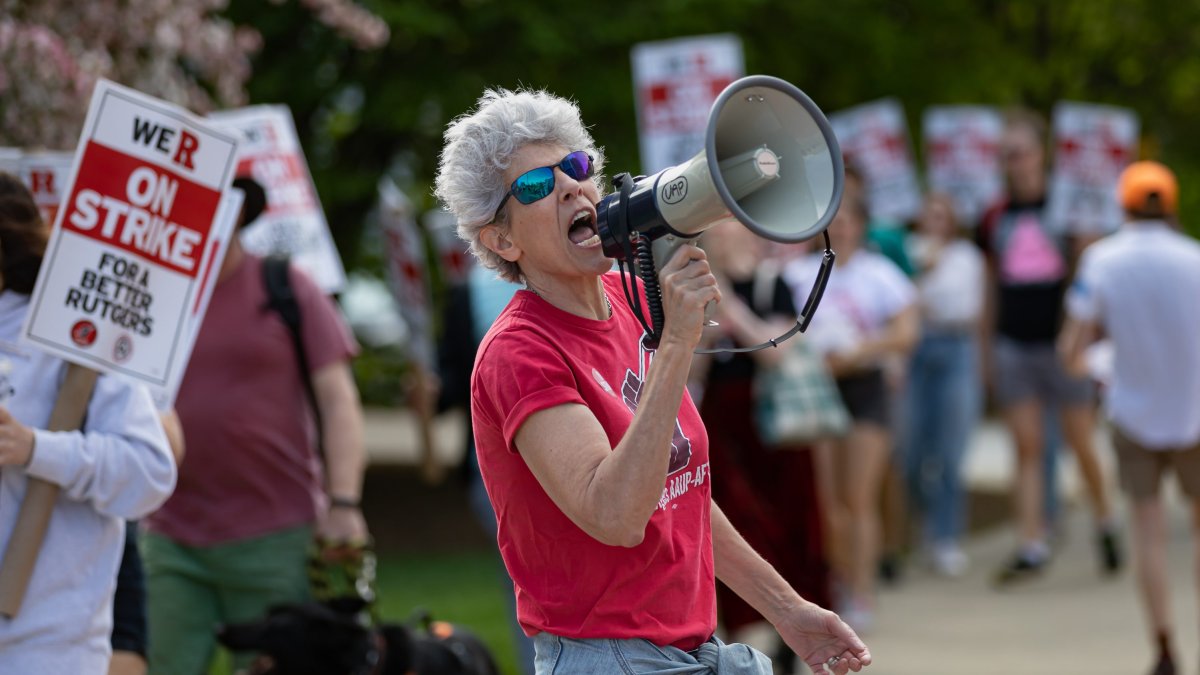What there is to know
- A week of negotiations in the New Jersey state capital appears to have finally moved forward as the historic Rutgers strike entered its fifth day on Friday, offering a hopeful sign of a speedy conclusion with just weeks to go before the semester exams.
- News of an agreement in principle on a key point of contention between the negotiations came from teachers’ unions at the weekend – the first major sign of progress since thousands of teachers went on strike for the first times Monday in the history of the university.
- The full impact of the strike on the end of the semester for the university’s 67,000 students remains unclear as they see exam and assignment dates pushed back repeatedly.
NEW JERSEY – A week of negotiations in the New Jersey state capital appears to have finally moved forward as the historic Rutgers strike entered its fifth day on Friday, offering a hopeful sign of a quick conclusion weeks away. semester exams.
News of an agreement in principle on a key point of contention between the negotiations came from teachers’ unions at the weekend – the first major sign of progress since thousands of teachers went on strike for the first times Monday in the history of the university.
The tentative agreement would make non-tenured full-time faculty eligible for “deemed renewal.” Essentially, these staff members would not have to re-apply upon termination of their contacts, as required by current policy.
“This is a game-changer for faculty members who have not had tenure protection,” said Rebecca Givan, president of Rutgers AAUP-AFT. “We have taken an important step to address the precariousness faced by more than 70% of Rutgers educators, researchers and physicians.”
Negotiations continued throughout the week and were expected to continue for an entire day on Friday and well into the weekend. Some of the discussions this week lasted late into the night, even after midnight, university president Jonathan Holloway explained in a campus-wide message Thursday.
The union says it’s been almost 300 days without a contract. At the heart of the shutdown are employee salaries and equal pay for adjunct faculty. Unions say it’s unfair that auxiliaries have to reapply every semester, regardless of seniority, and that graduating students aren’t paid a living wage for their services. They also want better salaries for clinical workers at the university’s health facilities on its sprawling campuses.
Three faculty unions representing some 9,000 educators, researchers and doctors at the university’s three main regional campuses in New Brunswick, Newark and Camden voted unanimously to authorize the strike after labor negotiations broke down last weekend. This is the first strike of its kind in the school’s 257-year history.
“The key is that we fight for better working conditions for our faculty so that learning conditions for students can be improved,” said media studies professor Deepa Kumar.
Unions have argued that many of their members are simply not earning enough to pay the bills, while salaries and budgets are rising for top managers and coaches.
Pickets were formed on all three campuses, as well as in the state capital, often taking to nearby streets to spread the word. Some stood outside the homes of members of the Board of Governors.
“If we can get the members of the board of governors to listen to us and then talk to (President Holloway), I think that would help move the negotiations forward,” said Hank Kalet, a striking adjunct professor.
Rafael Pujols with the details.
Countless students gathered to show their support for the faculty just weeks before the end of the semester.
“I still have concerns, but at the end of the day it’s not about me, it’s about people educating me,” said senior Lauren Lake.
The full impact of the strike on the end of the semester for the university’s 67,000 students remains unclear as they see exam and assignment dates pushed back repeatedly.
“There is a rumor that he will pass/fail; there’s a rumor that we might get all the A’s; there’s a rumor that it’s like there’s no credit, but we’re not really sure,” sophomore Dylan Eskow said.
Rutgers says he is cautiously optimistic that a quick agreement will be reached with several unions, including the AAUP-AFT and the AAUP-AFT’s part-time teachers’ section. He also says he has held more than 100 negotiation sessions with union leaders and will continue talks until full agreements on pay and other issues are reached.
Meanwhile, the university says it is open and operating on a normal schedule, with only a few weeks left in the semester, while negotiations continue. This student FAQ page has more information about the implications of the strike.
Alfredo Acosta briefs us from New Jersey.
“The continued academic progress of our students is our primary concern, and we will do everything we can to ensure their progress is not impeded by a strike,” Rutgers President Jonathan Holloway said in a statement.
In an email to the campus community on Sunday, Holloway said, “To say this is deeply disappointing is an understatement, especially since just two days ago both parties agreed to good faith to appoint a mediator to help us come to an agreement.” Agreements”.
Talks between the two sides resumed on Monday, with Governor Phil Murphy hoping for a quick resolution.
“I expect a result, a fair deal for all parties, as soon as possible. But I am not in favor of a deal on the backs of our students,” he said.
“We have already accomplished more in days than months, thanks to Governor Murphy’s invitation to negotiate in Trenton and the strength of our members on the picket line,” Givan said Friday. “But difficult issues remain, and we have a long way to go before we have a contract.”

